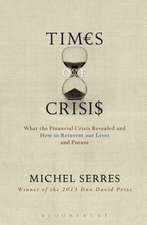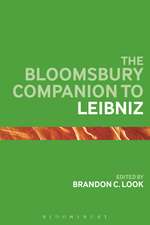The Subject of Rosi Braidotti: Politics and Concepts
Editat de Bolette Blaagaard, Iris van der Tuinen Limba Engleză Paperback – 29 iul 2015
| Toate formatele și edițiile | Preț | Express |
|---|---|---|
| Paperback (1) | 186.82 lei 6-8 săpt. | |
| Bloomsbury Publishing – 29 iul 2015 | 186.82 lei 6-8 săpt. | |
| Hardback (1) | 774.93 lei 6-8 săpt. | |
| Bloomsbury Publishing – 24 sep 2014 | 774.93 lei 6-8 săpt. |
Preț: 186.82 lei
Preț vechi: 241.86 lei
-23% Nou
Puncte Express: 280
Preț estimativ în valută:
35.75€ • 37.33$ • 29.52£
35.75€ • 37.33$ • 29.52£
Carte tipărită la comandă
Livrare economică 15-29 aprilie
Preluare comenzi: 021 569.72.76
Specificații
ISBN-13: 9781474236720
ISBN-10: 1474236723
Pagini: 296
Dimensiuni: 156 x 234 x 23 mm
Greutate: 0.43 kg
Editura: Bloomsbury Publishing
Colecția Bloomsbury Academic
Locul publicării:London, United Kingdom
ISBN-10: 1474236723
Pagini: 296
Dimensiuni: 156 x 234 x 23 mm
Greutate: 0.43 kg
Editura: Bloomsbury Publishing
Colecția Bloomsbury Academic
Locul publicării:London, United Kingdom
Caracteristici
Advances cultural and political debates on the post-human, technology, citizenship and difference
Notă biografică
Bolette Blaagaard is Assistant Professor of Communications at the Department of Communications and Psychology at Aalborg University, Copenhagen, Denmark, and honorary visiting fellow at the Centre for Law, Justice and Journalism at City University, London. Iris van der Tuin is Associate Professor of Gender Studies and Philosophy of Science in the Graduate Gender Programme of Utrecht University, the Netherlands.
Cuprins
Notes on ContributorsAcknowledgementsPreludeIntroduction Iris van der Tuin (Utrecht University, the Netherlands) and Bolette Blaagaard (Aalborg University, Denmark)Part I: The Concept of the Posthuman1. Reflections on Ethics, Destructiveness, and Life: Rosi Braidotti and the Posthuman Judith Butler (University of California, Berkeley, USA)2. Killing in a Posthuman World: The Philosophy and Practice of Critical Military History Joanna Bourke (Birkbeck College, UK) 3. The Future of Scenarios: State Science Fiction Peter Galison (Harvard University, USA)4. Living in Molecular Times Henrietta Moore (Jesus College, Cambridge University, UK)5. Imagining Posthumanities, Enlivening Feminisms Cecilia Åsberg (Linkoping University, Sweden)6. Transplanting Life: Bios and Zoë in Images with Imagination Patricia Pisters (University of Amsterdam, the Netherlands) italics7. Disaster Feminism Claire Colebrook (Penn State University, USA)8. Pro-Proteus: The Transpositional Teratology of Rosi Braidotti Patricia MacCormack (Anglia Ruskin University, UK)9. Reading Rosi Braidotti: Returning to Transpositions Clare Hemmings (London School of Economics, UK) italicsInterlude10. Patterns of (Dis)appearance Natascha Unkart (independent photographer, Vienna)11. Encountering the Nomadic Subject with a Smile Piet van de Kar (independent sculptor, Amsterdam)Part II: The Politics of the Academic 12. On Generation(s) Luisa Passerini (European University Institute in Florence, Italy and Columbia University, NY, USA)13. Rosi Braidotti and the Affirmation of European Women's Studies: Points of No Return Aino-Maija Hiltunen (Hilma-Network for Gender Studies at the University of Helsinki, Finland), Annamaria Tagliavini (Director of Biblioteca Italiana delle Donne, IT) and Berteke Waaldijk (Utrecht University, the Netherlands)14. For a Babyboomer Philosopher Nadia Setti (University of Paris 8, France)15. The Subject in Question Martine Menès (L'Ecole de Psychanalyse des Forums du Champ lacanien and Collège de clinique psychanalytique, Paris, France)16. Between Two Worlds: Nomadism and the Passion of an Encounter Maria Serena Sapegno (Sapienza Universita di Roma, Italy)17. Transposing NOISE and Voice Rosemarie Buikema (Utrecht University, the Netherlands) and Nina Lykke (Linköping University, Sweden) 18. Nomadic Encounters: Turning Difference Toward Dialogue Kelsey Henry (Wesleyan University, USA), Iveta Jusová(Antioch University, USA) and Joy Westerman (Knox College, USA)19. On Farming the Liberal Arts Catharine R. Stimpson (NYU, USA)20.. R.B. to Life Chrysanthi Nigianni (University of East London, UK)21. Nomadic Subjects and the Feminist Archives Lisa Baraitser(Birkbeck, University of London, UK)Part III: The Ethics of the Nomad22. Nomadic Subjects and Asylum Seekers Genevieve Lloyd (University of New South Wales, Australia)23. Translating Selves: On Polyglot Cosmopolitanism Sandra Ponzanesi (Utrecht University, the Netherlands)24. Nomadic Theory as an Epistemology for Transnational Feminist History Chiara Bonfiglioli (University of Edinburgh, UK)25. The Struggle for Europe Rutvica Andrijasevic (Leicester University, UK)26. Law's Nomadic Subjects: Towards a Micropolitics of Post-Human Rights Patrick Hanafin (Birkbeck College, UK)27. Collaboration* Gregg Lambert (Syracuse University, USA)Postlude28. The Untimely Rosi Braidotti (Utrecht University, the Netherlands)Rosi Braidotti Bibliography 1980-2013Index
Recenzii
Where on our bookshelves are Rosi Braidotti's works - Spinoza, French philosophy, feminism or in a category of their own? For those of us who have followed Rosi's nomadic pathway from analytic philosophy through currents of feminism to post-humanism, this book reminds us not just of her passionate engagement with ideas but also of the impact of her personality. The sheer breadth of her scholarship and her sympathies is mediated by her ability to inform and inspire. The essays here range over her interests and draw us in yet again to the debates close to her heart.
Jump, stitch, dance, embrace, repel, think, listen, play, sculpt, write, laugh, repair, resist, read and read again, talk, yearn, leap, build, compose and decompose-all of these only hint at the transformational materialist feminist practice offered to us by and with Rosi Braidotti. Her experiential nomadic ethics position us to move with, through, and for worlds that might yet be less lethal, richer, more attuned to the affectivities of fleshy difference of situated human and more-than-human subjects. The Subject of Rosi Braidotti draws me into its tissues with the same kind of verve that Braidotti herself exemplifies in her performances, writings, activisms, and bodily vitalities. Braidotti reconfigures what and whom she touches; she is a practitioner of feminist transpositions, metamorphoses, and transductions. I know because she has transformed me again and again. The many essays in this book pulsate with the energies-conceptual, political, and affectional-that Braidotti gives us.
Rosi Braidotti has been a dynamic presence on the global philosophical stage for over three decades. The extent of her work and influence is reflected in this fine collection of essays by an international array of philosophers, historians, humanities and social science scholars, gender and feminist theorists and activists who have followed her critical and creative engagement with the question of the subject and who in these pages collectively engage the process of becoming-subject that is Rosi Braidotti.
As a writer and a person, Rosi Braidotti encountered some of the most significant intellectual forces of the late twentieth century, including feminism, poststructuralism and posthumanist thought. These encounters were always transformative in both directions, nowhere more so than in her engagements with Deleuze's philosophy. The gust of wind that I first encountered in Paris in 1977 became a whirlwind that swept new ideas and activism across the academic landscape and continues to do so. This volume is a fitting tribute to an extraordinary life and work still underway.
Jump, stitch, dance, embrace, repel, think, listen, play, sculpt, write, laugh, repair, resist, read and read again, talk, yearn, leap, build, compose and decompose-all of these only hint at the transformational materialist feminist practice offered to us by and with Rosi Braidotti. Her experiential nomadic ethics position us to move with, through, and for worlds that might yet be less lethal, richer, more attuned to the affectivities of fleshy difference of situated human and more-than-human subjects. The Subject of Rosi Braidotti draws me into its tissues with the same kind of verve that Braidotti herself exemplifies in her performances, writings, activisms, and bodily vitalities. Braidotti reconfigures what and whom she touches; she is a practitioner of feminist transpositions, metamorphoses, and transductions. I know because she has transformed me again and again. The many essays in this book pulsate with the energies-conceptual, political, and affectional-that Braidotti gives us.
Rosi Braidotti has been a dynamic presence on the global philosophical stage for over three decades. The extent of her work and influence is reflected in this fine collection of essays by an international array of philosophers, historians, humanities and social science scholars, gender and feminist theorists and activists who have followed her critical and creative engagement with the question of the subject and who in these pages collectively engage the process of becoming-subject that is Rosi Braidotti.
As a writer and a person, Rosi Braidotti encountered some of the most significant intellectual forces of the late twentieth century, including feminism, poststructuralism and posthumanist thought. These encounters were always transformative in both directions, nowhere more so than in her engagements with Deleuze's philosophy. The gust of wind that I first encountered in Paris in 1977 became a whirlwind that swept new ideas and activism across the academic landscape and continues to do so. This volume is a fitting tribute to an extraordinary life and work still underway.








